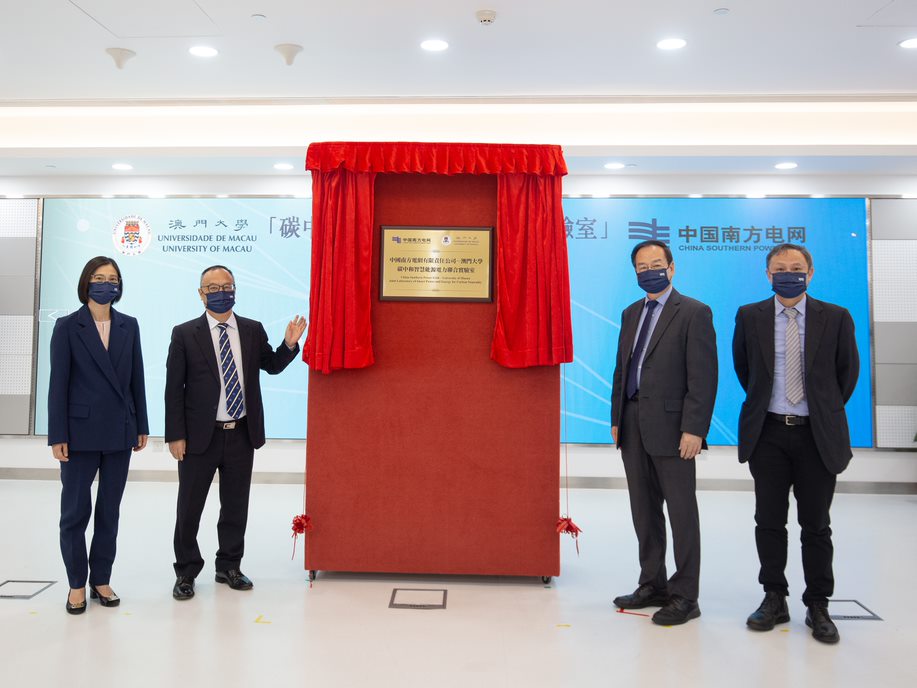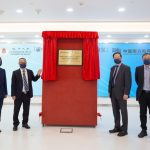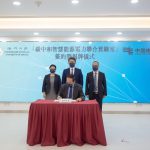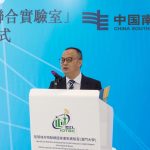 The plaque unveiling ceremony for the China Southern Power Grid – University of Macau Joint Laboratory of Smart Power and Energy for Carbon Neutrality
The plaque unveiling ceremony for the China Southern Power Grid – University of Macau Joint Laboratory of Smart Power and Energy for Carbon Neutrality
The University of Macau (UM) and China Southern Power Grid Co, Ltd (China Southern Power Grid) today (8 September) signed a collaboration agreement online on the establishment of the China Southern Power Grid – University of Macau Joint Laboratory of Smart Power and Energy for Carbon Neutrality and held a plaque unveiling ceremony for the laboratory. Through university-enterprise collaboration, the joint laboratory will give full play to the strengths of both parties, carry out scientific and technological research, talent training, and industrial promotion in the field of carbon-neutral smart power and energy systems, realise the deep integration of industry, universities, and research institutes, and promote innovation and development of the power and energy industry in Macao, the Greater Bay Area, and across China.
Ge Wei, vice rector of UM, and Li Rui, general manager of the Innovation Management Department of China Southern Power Grid, signed the agreement on the establishment of the joint laboratory. The signing of the agreement was witnessed by Wang Hongzhi, general manager of China Southern Power Grid; Fang Lei, deputy director of the Scientific and Technological Innovation Bureau of the State-owned Assets Supervision and Administration Commission of the State Council; Liang Qinru, deputy head of the Department of Science and Technology of Guangdong Province; Huang Shengbiao, deputy head of the Economic Affairs Department of the Liaison Office of the Central People’s Government in the Macao SAR; Chan Tze Wai, deputy director of the Economic and Technological Development Bureau of Macao; Yonghua Song, rector of UM and director of the State Key Laboratory of Internet of Things for Smart City; and core members of the joint laboratory.
In his speech, Wang said that China Southern Power Grid has a good foundation for collaboration with UM and has been serving the needs of economic and social development of Hong Kong and Macao. He expressed hope that the establishment of this joint laboratory would lead to extensive collaboration in forward-looking basic research, breakthroughs in key technologies, product development, and the transformation of research results among Guangdong, Hong Kong and Macao in the field of energy and power, adding that the joint laboratory would also help to create a more flexible, diversified, open, and inclusive innovation culture, build a clean and low-carbon Greater Bay Area, and develop the Greater Bay Area into an international centre of technological innovation with global influence.
In her speech, Chan pointed out that the second five-year plan of the Macao SAR clearly states the importance of continuously working towards the goal of carbon peaking and carbon neutrality. She expressed hope that the joint laboratory would provide Macao with the appropriate environment to carry out scientific research work for carbon neutrality and would combine the strengths of UM in research and the capabilities of China Southern Power Grid in industrial and technological development to accelerate industry-academia technology transfer, which is in line with the initiative of meeting the needs of the country with Macao’s strength.
In his speech, Song said that UM as a public comprehensive university in the Macao SAR has been actively promoting the moderate economic diversification of Macao, the construction of the Guangdong-Hong Kong-Macao Greater Bay Area, and the development of science education in China. To support China and Macao in achieving the strategic goal of carbon neutrality, UM has created systematic development plans and carried out a series of long-term and in-depth work in academic research, industrial promotion, and talent training in related fields. UM’s State Key Laboratory of Internet of Things for Smart City has been conducting research on theories and technologies for low-carbon operation optimisation and the protection of integrated energy systems in smart cities based on the Internet of Things, big data, and artificial intelligence; The Institute of Applied Physics and Materials Engineering has been carrying out research on fundamental theories and technologies such as new energy collection, high-density energy storage, and carbon dioxide conversion. Through the abovementioned cross-disciplinary platforms, UM is committed to promoting theoretical and technological advances in carbon neutrality, driving forward the development of the carbon neutrality industry, and cultivating all-rounded carbon neutrality professionals.
China Southern Power Grid, established in 2002, is a state-owned enterprise managed by the central government and invested by the State-owned Assets Supervision and Administration Commission of the State Council. China Southern Power Grid is responsible for the investment, construction, operation, and management of the Southern regional power grid, providing electricity supply for five provinces, namely Guangdong, Guangxi, Yunnan, Guizhou, Hainan, as well as Hong Kong and Macao. The company has also participated in the development and operation of power facilities in Southeast Asia and countries targeted by China’s ‘Belt and Road’ initiative. China Southern Power Grid has been ranked among the world's top 500 companies for 17 consecutive years and is currently ranked No 91. As one of the leading companies in China's energy industry, China Southern Power Grid has strong industrial and R&D capabilities in the field of carbon-neutral smart power and energy systems.




